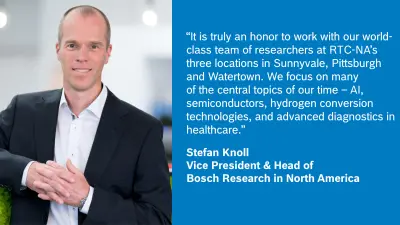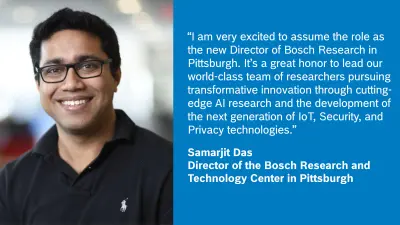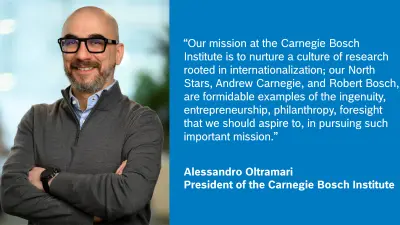New management team for Bosch Research USA
Bosch Research has appointed a new management team for the locations in the USA to further advance research fields such as AI, semiconductors, and healthcare.
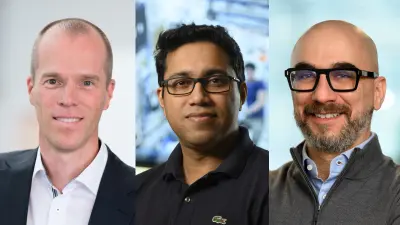
Recently, Bosch Corporate Research announced three new leadership promotions within the Bosch Research and Technology Center in the United States: Stefan Knoll has been named vice president and head of Bosch Research in North America; Samarjit Das has been promoted to director of Bosch Research and Technology Center and Alessandro Oltramari is now president of Carnegie Bosch Institute (CBI). The new management team will help strengthen Bosch’s critical research in artificial intelligence (AI), semiconductors, hydrogen technologies, electrification and healthcare diagnostics.
Bosch Research, with its U.S. locations in Sunnyvale, California; Pittsburgh, Pennsylvania; and Watertown, Massachusetts; delves into various pioneering research areas — in close cooperation with all Bosch Research locations worldwide. At these locations, Bosch Research hosts over 130 researchers and various technical labs that employ state-of-the-art equipment, such as a Robotics Lab, Hydrogen Lab, Human Machine Interaction Lab, Biosensors Lab, Microsensor Systems Lab, and Integrated Circuits Lab.
Cutting-edge technology at all locations
In Watertown, connected to one of the premier research and innovation ecosystems in the U.S., the team is focused on Computational Materials Science and Engineering, to deliver modeling and theory for novel solutions to innovation challenges at Bosch in fields such as energy technologies, sustainability, and sensing technologies. This enables selection and discovery of materials for various industrial applications, ranging from automotive to electronics to climate and healthcare solutions.
In Pittsburgh the emphasis lies on the topics of Cybersecurity as well as AI research and innovation, both in close cooperation with Carnegie Mellon University. The AI research and innovation team specializes in signal processing and machine learning as well as advanced perception and reasoning systems to enable AI-empowered products and services across Bosch business domains. One example is audio AI technology to detect gunshots, embedded in security cameras. Advancing the conception, creation, and — in some cases, a critical step — distillation of multimodal foundation models for mobility solutions, advanced manufacturing, and consumer products is an important area of expertise.
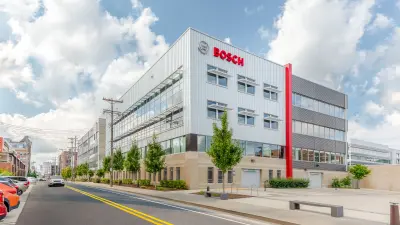
With all the benefits of being part of the Cybersecurity ecosystem and community in Pittsburgh, often considered the birthplace of Cybersecurity, the Cybersecurity research team creates innovative security and privacy solutions that protect products and infrastructure and opens up new business opportunities for Bosch.
The Carnegie Bosch Institute at Carnegie Mellon University hosts the Carnegie Bosch Fellowship, supports breakthrough research projects, and provides support for Carnegie Bosch chaired Professorships.
In Sunnyvale, at the heart of Silicon Valley, the team is dedicated to cutting-edge research and innovation in several domains relevant for Bosch. Being at the North American epicenter for AI innovation, one of the themes in Sunnyvale is to push the boundaries of AI. Work spans essential areas such as Natural Language Processing (NLP) / Large Language Models (LLM), computer vision, multimodal foundation models, and extends into specialized fields including robotics, Advanced driver-assistance systems (ADAS) and automated driving, as well as smart manufacturing. By combining the strengths of artificial with human intelligence, the team creates secure, scalable, trustworthy, and assistive AI systems. A further emphasis on AI systems engineering ensures advancements in secure and scalable infrastructures for AI project deployments across the globe.
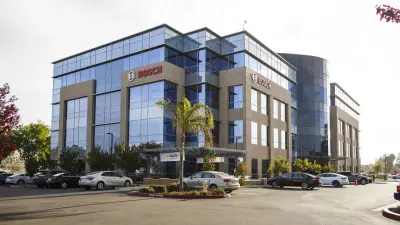
Another theme in Sunnyvale is modeling, design, and control of energy systems and materials. Fundamental understanding, improved designs, and optimal performance of energy systems are provided by using laboratory experiments, advanced analytics, modeling, and simulation. Electrochemical Engineering is a particular area of expertise supporting research and innovation on energy conversion and separation technologies, including fuel cells, electrolyzers, and carbon capture systems.
Finally, a third theme in Sunnyvale is research and innovation of Intelligent and Connected Sensors and Systems, addressing the increasing demand for smart sensing solutions. The team advances Wireless Connectivity and Sensing technologies, where the radio becomes the sensor, and Sensor Systems and application-specific integrated circuits (ASICs) to empower efficient data collection and processing. Bio-Electronics represents a further important research field, exploring the integration of biological elements with electronic systems to enable future Bosch products in the field of medical diagnostics.
Across these U.S. based locations, Bosch Research demonstrates a commitment to innovation and interdisciplinary collaboration, tackling complex challenges to shape the future of technology and industry — now with a new management team.
To get to know the colleagues better in their new roles, here is a brief summary of their careers to date:
Stefan Knoll has spent his entire career at Bosch. He began in 1999 as a development engineer in Brake Systems in Stuttgart, Germany. After working in various positions in Detroit, Michigan, U.S., and Germany, including product development in Driver Assistance Systems, he moved back to the U.S. in 2019 — this time to Silicon Valley, as a vice president working with mobility customers. As the vice president and head of Bosch Research in North America, Stefan Knoll now leads a team of world-class researchers in Sunnyvale, Pittsburgh, and Watertown.
Samarjit Das started at Bosch’s Research and Technology Center in Pittsburgh as a research scientist in 2013. Among other projects he was the principal researcher and project lead for Bosch’s SoundSee space mission in partnership with Astrobotic Technology Inc. to perform autonomous acoustic monitoring aboard the International Space Station (ISS). SoundSee was launched to the ISS in 2019 as experimental sensor technology as part of a research collaboration with NASA. In his new role as the director of Bosch Research and Technology Center in Pittsburgh, Das leads a team focusing on cutting-edge AI research, as well as developing next generation Internet of Things (IoT) and security privacy technologies. He will also continue his role as the chief scientist of Signal Processing and Machine Learning research at Bosch Research.
Alessandro Oltramari is president of CBI and a senior research scientist at Bosch Research Technology Center in Pittsburgh. He joined Bosch Research in 2016, after working as a research associate at Carnegie Mellon University (CMU). As a world-class academic and industry collaboration institution for more than 30 years, CBI is a unique alliance between CMU and Bosch. At Bosch Research, Oltramari focuses on neuro-symbolic reasoning for decision intelligence. His primary interest is to investigate how knowledge systems can be integrated with learning algorithms, and help humans and machines make sense of the physical and digital worlds.
